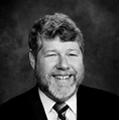Carl Strauch

B.S. 1974
Physician, Galesburg Cottage Hospital
Carl Strauch became a statistics major in the early 1970s because statistics and probability intrigued him. In fact, it was by chance that he ended up at Purdue. "The year I graduated from high school, 1970, was a turbulent time at college campuses," he said. "Growing up in Illinois, I had always thought I would go to the University of Illinois, but there was a lot of campus unrest at Champaign. My mother suggested Purdue. The only thing I had heard about Purdue was what I had read in the sports pages, but when I visited, I liked the programs and the people. It was a pretty benign campus as far as politics went."
"I really enjoyed my four years there," Strauch said. "I enjoyed the whole big college experience—the athletic events, the Loeb playhouse series, world class classical music—but it still has that small college atmosphere. I knew the people in my dorm well, and the math and statistics departments were small enough that you could still know the professors and know the people in your classes."
As much as Strauch enjoyed his statistics courses, pursuing statistics as a career was another story. "One of the things the department was lacking at that time was information about what you could do with a degree," Strauch said. "Outside of teaching or being an actuary, there were not many options." Instead, he decided to add pre-medical courses to his schedule his sophomore year. "My father is a physician, so I guess it was always in the back of my mind."
Even though Strauch did not pursue statistics directly, the background he gained at Purdue would prove to be helpful in his career as a physician. "My math/stat background helps me think logically and in a structured and organized manner, which helps in making a diagnosis," he said. "In medicine, you really have to break things down—what is the chance that they have this disease; what is the most logical/probable diagnosis?"
Being able to think through diagnoses efficiently is important when Strauch is working 12-hour days. "I get out of the house a little after 6:00 a.m. to do hospital rounds. That goes from 6:30 to whenever. I arrive at the office around 9:00, with office patients from 9 to 5. Then I make phone calls after that. If I have patients admitted to the hospital during the day, I’ll go back at night to see them. It’s a two-hospital town with no residents. So we do everything."
For today’s students interested in both medicine and statistics, Strauch said, "biostatistics is a viable option." He explained, "As health care costs skyrocket in America and become a larger percentage of the Gross National Product, health care has become even more of a crisis than it was. We’ll need to find ways of making medicine more cost effective." There are MD-PhD programs in biostatistics, Strauch said, and biostatisticians will play a large role in analyzing the economic factors of health care and devising solutions.
For those interested in becoming physicians, Strauch advised, "A strong background in chemistry is important; less emphasis is placed on biology. Any hospital experience, whether working or volunteering, is a plus."
To read more Alumni Profiles, please visit our Alumni Profiles archive.